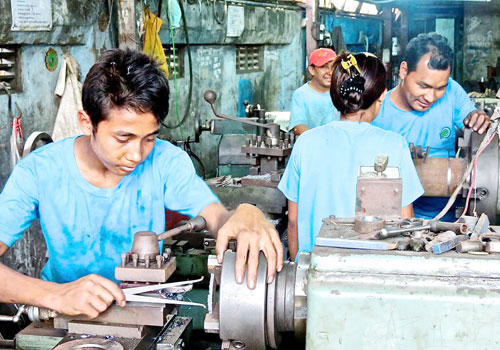UK-funded program will target companies with projects to strengthen value chains and promote inclusive economic growth in Myanmar
12 กรกฎาคม 2560
A grant window will be launched next month by a UK-funded program to target companies with projects to strengthen value chains and promote inclusive economic growth.
In a briefing held by the British Chamber of Commerce Myanmar in Sule Shangri-La, Yangon, on July 7, Peter Brimble, the team leader from DaNa Facility, outlined the progress on the development of Myanmar’s private sector and the program’s latest action plan.
He added that DaNa Facility (DaNa) will launch the Business Innovation Window in late August with an emphasis on businesses in agribusiness, community forestry, garments and textiles and financial inclusion.
The matching grant fund will primarily target companies and anticipate four separate sub-windows based on those four focus sectors. Grant sizes will be between £250,000 and £750,000.
Mr Brimble said that the Business Innovation Window would look for innovative business ideas which will address current market failures and disrupt “business as usual”. The project ideas have to aim to be commercially sustainable once the DaNa Facility grant funding ends.
“The DaNa Facility supports inclusive economic growth through responsible and sustainable private sector development.
“Already, we are implementing the Economic Empowerment Window for women and conflict zones since earlier this year.
“Next month, we are planning to run the Business Innovation Window [BIW] for start-ups,” he said.
DaNa is funded by the UK Department for International Development (DFID), which provided £25 million (K43.9 billion), and supports inclusive economic growth and private sector development in Myanmar, through responsible and sustainable business growth, investment and trade.
The DFID-funded program was established in May 2016 as one of three components of DFID’s wider “Business for Shared Prosperity” (BSP) program, and runs for five years until December 2020. DFID’s portfolio of activities supports the Myanmar government’s objectives and policies on economic development, which includes the Livelihoods and Food Security Trust Fund and trade and investment activities through the World Bank Group.
For DaNa, inclusive economic growth refers to growth which focuses on creation and expansion of economic opportunities, and ensures broader access to these opportunities.
Earlier this year, DaNa launched the Economic Empowerment Window. The program has since shortlisted 10 projects which are invited to submit full proposal.
In total, six projects were selected for grants, comprising mung bean project in dry zone locations, agriculture development project in Pa-O area, avocado, coffee and EFY project in southern Chin and Shan states, community forestry project in Kachin and more.
The six projects implemented via the Economic Empowerment Window are led by four domestic non-governmental organisations (NGOs) and two INGOS, and all six will have private sector partners involved in the consortia, according to Mr Brimble. The projects also have a wide geographical footprint, including minority ethnics and post-conflict areas.
The Economic Empowerment Window places an emphasis on empowering women and other disadvantaged groups, benefitting from Myanmar’s economic development, and helping to shape the growth of more inclusive, competitive and wealth-creating markets, he explained.
“The Economic Empowerment Window program focuses on women’s economic empowerment, conflict-affected or post-conflict areas and social and environmental sustainability.
“Currently, we have an emphasis on garments and textiles, agribusiness, community forestry and financial inclusion,” he said.
Five pillars for PSD
In his presentation, Mr Brimble said that there are five main pillars of Myanmar’s private sector development: legal and regulatory reforms, trade and investment, human capital, access to finance and the state and private enterprise.
The main features for the country’s private sector he highlighted include shortages of infrastructure and energy, limited financial services, especially for small and medium-sized enterprises (SMEs), the administration’s approach remain firmly regulatory, few support programs for start-ups or entrepreneurs and the need for improved private sector development (PSD).
In addition, Mr Brimble outlined the action plan for Myanmar’s PSD.
A PSD Committee chaired by Myanmar’s vice president was formed in October last year.
In April this year, the committee organised the first workshop. According to the workshop notes seen by The Myanmar Times, the committee is willing to be more inclusive and has indicated a possible involvement of the Myanmar Young Entrepreneurs Association and foreign chambers in the working committees. The committee also formed breakout groups to develop working committee action plans.
DaNa will support the committee by collaboration with the Ministry of Commerce and Directorate of Investment and Company Administration (DICA), according to Mr Brimble.
He explained that the private sector is important to tackle the country’s development challenges. This is because PSD leads to improved infrastructure access and connectivity; helps accelerate human resource development, foster regional integration, alleviate poverty through job creation, build disaster resilience and mitigate impact of natural disasters.
According to the PSD Framework and Action Plan published in March 2016, PSD is a dynamic and multi-faceted process by which the government creates an enabling business environment that encourages citizens to start and expand businesses that contribute to market-led economic growth. Healthy PSD is characterised by robust enterprise and job creation; dynamic SMEs; entrepreneurship, risk-taking, innovation, and healthy competition; gender equality; growing trade and investment; human resource and industrial development; and expanding businesses which provide goods, services, and opportunities for all members of the community.
The publication also argued that the main purpose of PSD should be to stimulate economic growth and social development for all men and women. Effective PSD increases livelihood opportunities and enables people to follow their dreams and improve their lives. Collectively, economic growth and social development will reduce poverty and inequality and also enhance national productivity, competitiveness, and economic security.
Dana Facility is also working with Ministry of Commerce to support the implementation of the National Export Strategy and engaging in key stakeholders within DaNa Facility’s prioritised sectors, according to the program’s team leader.
(The Myanmar Times: http://www.mmtimes.com/index.










